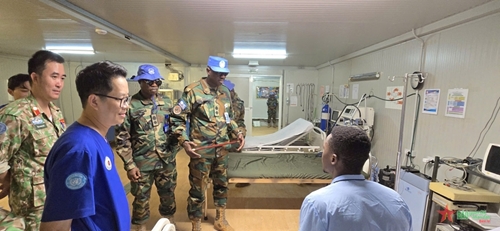Earlier, a 29-year-old male patient from Ghana was transferred to the L2FH Rotation 6. He had such symptoms as frequent vomiting, rapid but weak pulse, and low blood pressure. The patient was diagnosed with severe malaria based on symptoms such as continuous high fever (39.5°C), severe headache, consciousness disturbances, rapid pulse, low blood pressure, along with liver injury, blood clotting disorders, and low platelet count.
The medical team immediately began intensive resuscitation with intravenous fluids combined with specific antimalarial medication, antipyretics, liver detoxification drugs, and vitamin K1. Once the patient's condition stabilized, he was transferred to the Infectious Disease Ward for close monitoring and further specialized treatment. After three days, the patient had stable vital signs, and he was transferred to the level-1 hospital hospital for continued monitoring and treatment.
    |
 |
|
The patient successfully treated |
Severe malaria can progress very rapidly, with death occurring within hours to days. For most severe cases, the mortality rate can be as high as 20%, making early diagnosis through clinical experience, specific testing, and prompt treatment with antimalarial drugs crucial. Despite the severity of this case, the patient responded well thanks to early and timely treatment.
The Vietnamese blue berets’ successful treatment of the malaria has continued to prove their expertise and unwavering dedication to the patients.
Reported by Tien Xuan (from Bentiu, South Sudan)
Translated by Tran Hoai